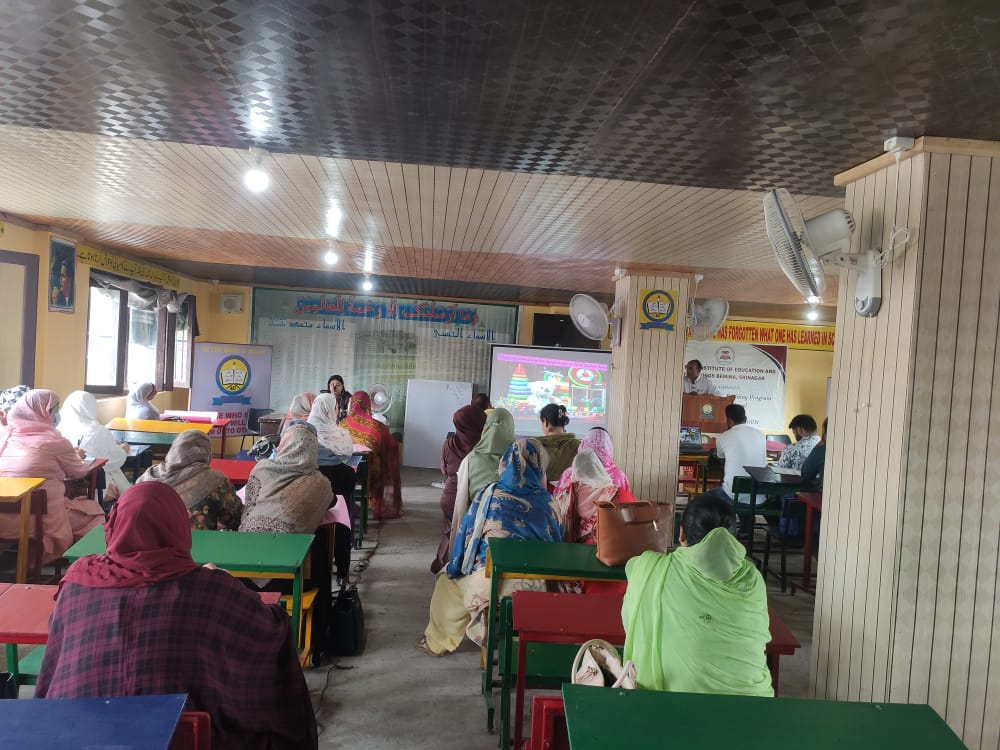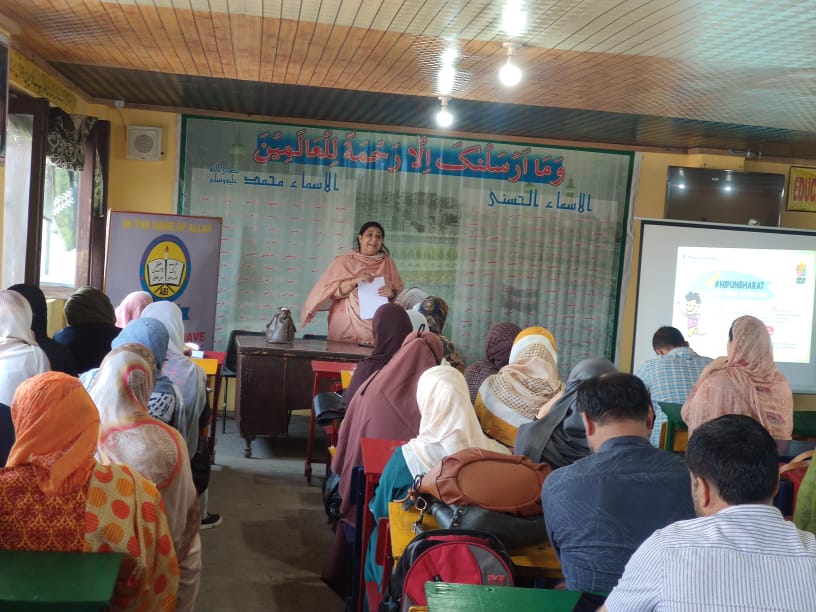The UT administration has taken a series of reformative measures in the education sector but much more needs to be done.
By Rayees Masroor
The emerging needs of our society call for reforms in the education system to produce global citizens who can build a strong workforce. Since taking over the reins of the UT administration, Lieutenant Governor Manoj Sinha has taken a keen interest in the education sector and has already created a task force in the form of education reform committees. The education department has also seen a dynamic and dedicated Principal Secretary B K Singh, who is willing to work hard in streamlining the department for better results.
In Kashmir division, Singh has been ably supported by the visionary Director of School Education Kashmir Dr Tassaduq Hussain Mir, who has generated a lot of goodwill for his kind approach and professional dealings with the stakeholders. As part of the reforms, many steps, like the introduction of kindergarten in government-run primary schools and the detachment of teachers from various non-teaching assignments, have already been taken.
Still, many educationists and experts have a point of view that could make reforms more beneficial and result-oriented. Some of the steps that can be considered for the implementation include:

Teachers Transfer Policy
The transfer policy for teachers in J&K needs a comprehensive review. The government argues that the transfer of teaching personnel should be made at the beginning of the academic year only, but we are already in May, and the teachers are still waiting for ATD. Some experts firmly believe that instead of ATD at the highest level, the job of transfers should have been assigned to the Chief Education Officers and the Zonal Education Officers with clear-cut guidelines from higher authorities. Ideally, a teacher’s transfer should occur every three years and must only be in the students’ interest.
Since the government has done away with the academic arrangements in the higher secondary schools over the last three years, teachers with subject-specific qualifications have been deployed to higher secondaries where there is a need. ATD being an automatic system, won’t cater to such requirements, and, in the case of female teachers, ATD has many shortcomings.
Some government schools, especially in cities and towns, have lesser enrolment and need fewer teachers, but ATD isn’t able to address this issue. There are already education reform committees at district and zonal levels. For the smooth conduct of the process, they could have efficiently helped the officers in the transfer of teachers. It is also important to highlight that CEOs and ZEOs are in a much better position to know the staff position, enrolment, and even the competence of teachers in their jurisdictions.
Rationalisation of Teachers
To promote a better PTR (Pupil Teacher Ratio) in the schools, the department has been carrying out the rationalization process for some time now. Still, it has not served the purpose because it is being done at the Zonal level only, where one subject-specific teacher from one school is deployed to another or a higher secondary school without considering the PTR.
A better rationalisation would have been to deploy the teachers from the cities and towns to nearby rural educational zones where poor students are enrolled. Government schools in urban education zones have more teachers than required in most cases. The nearby rural education zones, even at a distance of two or three kilometres, have massive enrolment but fewer teachers. The schools at various administrative headquarters usually have more teachers than required. This discrimination needs immediate attention.
Whether transferred or deployed to hard areas, the teachers should be given special incentives, while the female teachers should be given certain concessions during the annual transfers. Instead of appointing candidates for academic arrangements in higher secondary schools with vacancies, the government has preferred deploying higher qualified teachers to fill the gaps. It is not a wrong move, but such subject-specific teachers should be given some weightage during promotions for their contribution.
Promotions and Rewards
All professions offer their recruits the opportunity to pursue a career so that individuals can be promoted through a delineated promotions hierarchy. Promotion is the passage to a higher rank and is one of the reinforcers of the rewards system to help motivate employees. From a motivation perspective, employees are likely to reduce their efforts if rewards are allocated only to non-performance factors like seniority, job title, etc.
On the other hand, in a hierarchy, using promotion solely as a reward for good performance, people tend to enhance their performance. In fact, ‘pay for performance programmes are gaining more popularity, but we in J&K continue with a less motivational promotional policy for employees, especially the teachers, which is one of the reasons for the declining performance of government teachers.
There are so many other departments that offer promotions to their employees through departmental examinations. Why are no such opportunities for teachers who deserve to be rewarded, recognised, and motivated?
Teachers are often promoted as lecturers or masters when they are on the verge of retirement or have lost interest in assuming a new role. It would be beneficial even for the students and the department itself if, after five to six years of service, a teacher is allowed to appear in a departmental examination to enable himself to become a master or a lecturer. It would always keep a teacher motivated and up for the challenge.
‘Educationists and experts have a point of view which could make reforms in the education sector more beneficial and result-oriented.’
Special Attention to Kindergarten
Over the last decade, the government schools in J&K have faced a huge issue of declining enrolment. Still, in the previous two years, the school education department has been able to enroll a good number of students, for which the due credit goes to the principal secretary and the DSEK. But there is an apprehension if these new entrants could be retained. To address this issue, the integration of Anganwadi Centres with the nearby primary or upper primary schools should be done without any further delay.
The Issue of Curriculum
A carefully designed and well-executed curriculum plays a significant role in the success of a school and its students and teachers. When delivered by well-prepared and qualified educators, a strong curricular design ensures that the students can achieve the appropriate learning outcomes. In J&K schools, the curriculum needs revision, while the textbooks are not up to the mark. The primary and upper primary-level textbooks are outdated, boring, and devoid of any attraction.
Assessment and Evaluation
The assessment of the students intends to measure effectiveness, and evaluation adds a valuable component to the process. A teacher may assess a student to ascertain how well the individual successfully meets the learning target, but various faults in the process need to be addressed.
Also, teachers with poor results are punished, but, surprisingly, the officers are not held accountable. It is important that the officers also get ranked by their performance and held accountable.
‘Teachers with poor results are punished, but, surprisingly, the officers in charge of such schools are not held accountable at all. This needs to change.’
Teachers’ Training
Training, staff development, and skill enhancement programme for teachers play an essential role in successful education reform. They also serve as a bridge between prospective and experienced educators. Training offers one of the most promising roads to improvement. As such, the SCERT and DIETS should be more vibrant and goal-oriented. Unfortunately, our B.Ed. Programme is the most outdated, and it needs immediate revamp to cater to the modern educational standards of the educators and teachers.
The government should introduce special monthly scholarship schemes for BPL students, provide smart gadgets to such students and try to provide a better infrastructure for better results. Teachers acquiring higher education should be encouraged and facilitated as it would ultimately benefit the students and society.
The author can be reached at [email protected]

[…] Baba Saheb used to emphasize that “Our freedom is incomplete without the liberation of the Dalit society.” To achieve the emancipation of Dalit society, Babasaheb Ambedkar chose the path of mass […]